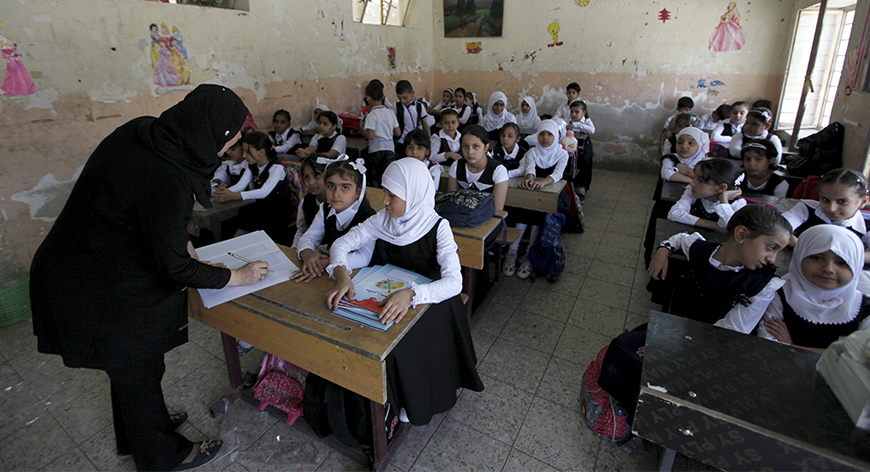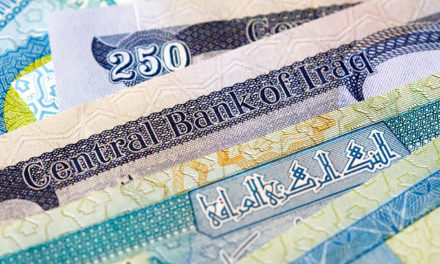(Photo: Ahmed Saad/Reuters)
Iraq’s education system was once hailed as the golden standard for education in the Middle East but has since deteriorated under the long-lasting devastation of the United Nations Security Council’s (UNSC) sanctions of the 1990s. The Iraqi government has long avoided any robust change to the education system, which many Iraqis are extremely dissatisfied with. An outdated curriculum, deteriorated school infrastructures, severe teacher shortages and hundreds of thousands of children unable to access schooling are some of the issues that plague the Iraqi education system. In order to implement reform, the Iraqi government must begin addressing these pressing issues, as well as increase their national budget allocation for education.
In the 1970s, Iraq began to develop a literacy campaign in order to build a labor force for its expanding sectors, especially oil. The Ba’ath Party wanted to nationalize the workforce and employ Iraqis, rather than having to import labor. In 1977, the allocation for education in the national budget of Iraq increased by 84 percent. This massive allocation allowed for the construction of nearly 700 primary schools and 300 secondary schools. The importance placed on education and literacy in Iraq was coded in law through Public Law 118, which authorized free compulsory education for all 6 to 15-year-olds. In 1978, the National Comprehensive Campaign for Compulsory Literacy Law was enacted, which put forth the eradication of illiteracy as a national issue. The education system expanded through the 1980s, even during the Iran-Iraq war. According to UNESCO, through the 1980s, Iraq allocated five percent of its national budget to education. This was higher than the average budget allocation for education in most developing countries, which was 3.8 percent at the time.
Prior to the sanctions, Iraq was making great strides in combatting female illiteracy in the country. According to UNICEF, female illiteracy declined from nearly 92% in 1957 to nearly 12% by 1990. After the sanctions were placed and many girls were pulled out of school, illiteracy rose almost 30% by 1997, almost triple the percentage just a few years prior. Although illiteracy rates and enrolment in secondary schools were negatively impacted, UNICEF estimated that female enrolment in higher education actually increased slightly from 6% in 1987 to 7.7% in 2000. This could be explained by the emphasis placed on higher education as a means of social mobility. Iraqi women, seeking to increase their chances for employment, began enrolling in publicly funded universities.
Following Iraq’s invasion of Kuwait and the imposition of sanctions against the country, Iraqi society suffered. Iraq could not sell its oil and had to enact a food ration program in order to avoid a famine. In 1995, the UNSC adopted Resolution 986 also known as the “Oil for Food programme” which would allow Iraq to trade oil for food, medicine and humanitarian aid. The deplorable living conditions led to an increase in infant mortality rates. In a survey conducted by UNICEF in 1999, infant mortality had risen from 47 per 1,000 birth to 108 per 1,000 births. It is believed that 500,000 children under five years old died during sanctions.
Due to worsening economic conditions, many students had to drop out of school in order to work and make money for their families. An estimated 30% of school children are believed to have dropped out during this time period. Public spending affected teachers’ salaries, sinking the average salary to $6 USD a month. In 1998, UN Spokesman Eric Falt stated that around 8,000 school buildings needed to be rehabilitated due to damage from war and overcrowding that has caused the need for more than 5,000 new schools to be built. Schools lacked basic sanitation such as running water and clean drinking water. At one point, the list of items banned from being imported into Iraq included pencils, because it was believed that the graphite in the lead could be used by the Ba’ath Party to create weapons.
The consequences of the sanctions on the Iraqi school system are still visible to this day. Shortly after the 2003 invasion, UNESCO in Iraq issued a report outlining the most important challenges concerning Iraq’s education system. Plans for action included working on raising attendance in school, increasing the literacy rate, reducing dropout rates and revising textbooks and curriculum. After almost two decades of wars and occupation, education is still inaccessible to some Iraqis. Not only are there infrastructural issues to the school system, but there are psychological costs to violence that impede students’ ability to learn. There are many internally displaced children in Iraq that do not have access to any form of public education. According to a 2016 UNICEF report, it is believed that there are 355,000 internally displaced children out of school in the country, especially in provinces that have been plagued with conflict in recent years at the hands of Da’ish. In order to accommodate the overwhelming number of children in school, schools have had to create multiple shifts to run classes throughout the day. Investment in education by the government is nowhere near what is desirable. Currently, Iraq has one of the lowest funded education systems in the Middle East even though in 2019 it had a GDP of more than $234 billion.
As Iraq continues to redevelop after decades of war, conflict and sanctions, it is imperative that the government begin focusing on the education sector. This does not only include primary and secondary level, but higher education as well. According to the 2018 Arab Barometer, when asked about their satisfaction with the education system, 46% of the respondents stated that they were completely dissatisfied with it. The Iraqi government must focus on solutions that empower youth and provide equitable educational opportunities. Displaced children and their inaccessibility to schooling should be a main concern for the government. The sanctions placed immense pressure on the education system and halted its growth and development. Curriculum and teaching methods are outdated by decades, and are in need of reform and updating. In addition, the Iraqi government needs to address the severe shortage of teachers and schools throughout the country. Education is a constitutionally protected right for all and every Iraqi should have equitable access to it.











